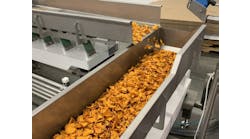Question: What protocol do you recommend for monitoring contaminants in compressed air?
Answer: Any recommendation is dependent upon the intended use of the air. In applications where compressed air does not come in direct contact with the food being prepared, less expensive compressors with oil are used. In this case, filtration of the final air being supplied is typically done at the point of use (a box maker, case packer, wrapping machine, etc.). It is also common to have a moisture trap at the point of use to minimize the amount of oil or moisture that could affect equipment components.
If compressed air comes in direct contact with foodstuffs or is being used for instrument operation, precautions should be taken. An oil-free compressor is recommended to prevent oil residuals. I recommend pulling your make up air from a refrigerated room, if available. It increases the efficiency of the compressor by up to 8 percent, and the air has already been filtered once. I also recommend you drop the temperature of the air below its dew point so you can remove as much moisture before it enters the distribution system.
Using a refrigeration system to do this is preferable to a desiccant drying system, which requires maintenance to deal with the desiccant’s breakdown into powder as it ages. You will always want to filter your air prior to its point of use but, depending upon your specifications, you may want to install a large air accumulator and a HEPA (high efficiency particulate arresting) filter or an ultraviolet sterilization system to purify the air of any microorganisms. For each filter you add, you must have a monitoring system to read the pressure drop on both sides of the filter so you know when to change it.
Compressed air can be very expensive. It’s important to determine your air specifications before you spend money on purification equipment.


